How do former Maoist combatants feel about the People’s War these days? Injured and physically disabled former Maoist combatants say “leaders showed us dreams, we fought for it risking our life and now the very dreams haunt us.”
Durga Lal KC, Center for Investigative Journalism-Nepal
As Patukhola flows along his house, Swarnim Kumar Batha prays for good luck before monsoon begins every year. Living by the banks of river Batha, a former Maoists combatant, often compares his insurgency-era time with his recent days. Then, Batha was ready to sacrifice his life to war but now he feels insecure even when downpour begins.
It’s because he himself experienced a decade long bloody war. He joined the insurgency prepared to sacrifice everything for change, there’s nothing left for him. His leaders assumed powerful positions shortly after signing of the peace deal in 2006. These days, he neither enjoys the support of his comrades nor any relatives.
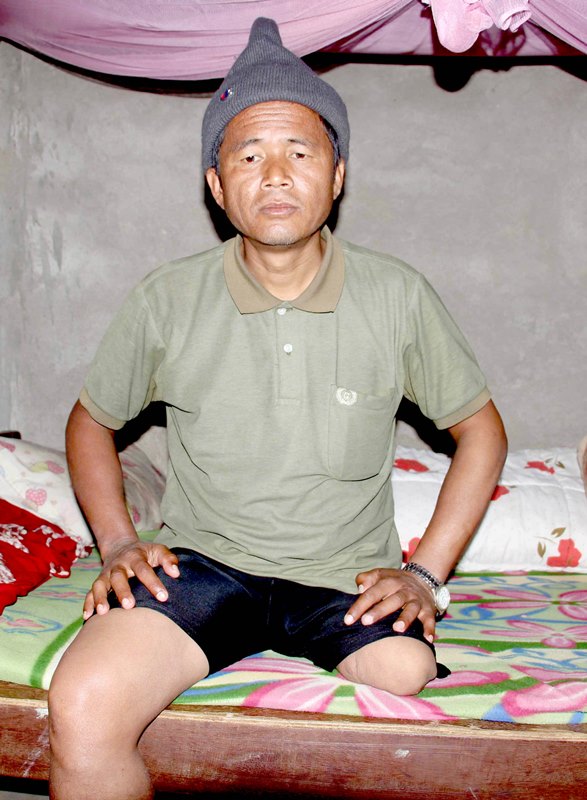
Swarnim Kumar Batha
Under the peace agreement signed between the government and rebel Maoists he spent six years at UN-monitored cantonment. He chose a voluntary retirement package, he and his wife received Rs 500,000 each before being discharged from the cantonment. Batha bought a piece of land in Dang but he couldn’t obtain a land ownership certificate because his was unregistered land. He has built a one-story building on the bank of the river that’s why he feels insecure when water level increases there.
Originally Batha is from Khara, which had drawn global attention after security personnel set this entire village into fire to express anger at Maoists in the context of nearby army barracks attacked twice and police killed.
Born and raised in the war devastated village Batha dreamt of developing the nation. Lured by the promise of a “building a new world” he had joined the war and committed to sacrifice life if the ambitious goal isn’t achieved. Unfortunately, Batha couldn’t win the world as stated but lost one of his legs to war. These days, he’s not dreaming anything other than reshaping the life devastated by war.
‘No wish to return home’
A bullet pierced through his left leg on March 2, 2004, when Batha along with other fellow fighters tried to take Bhojpur-based repeater tower of Nepal Telecom under control. The leg was injured so badly that doctors had to amputate it.
“For us death was a matter of pride during the war and we used to feel frustrated when not deployed at the front row,” Batha expressed dissatisfaction adding, “After war ended leaders ascended to power; our life is now doomed.”
His wife, Chetana Batha, also the former Maoist combatant, had joined the war when she was 15-year-old. She’s not physically fit so is her mental state. Although she was lucky enough to return safe from Khara attack earlier in May a bullet pierced through her leg while responding to firing of the then Royal Nepal Army in Guranse of Salyan in June 2002. Her body is covered with shrapnel.
“The leg needs to be amputated to remove shrapnel. Due to the delay in removing it often swells. I’m living a painful life,” said Chetana adding, “We fought war risking our life. What I now realize is that nothing is more important than doing your household chores.”
These days, Chetana spends most of her time taking care of injured husband.
After being discharged from a Dang-based state cantonment and getting a retirement package provided by the government the couple feel humiliated: ‘how the people like us determined to conquer the world returned home losing legs.’ Feeling humiliated, they decided not to return to their home village, Rukum. Instead, they procured a piece of land in Patukhola of Tulsipur to begin a new inning of life there.
“We were left without cash shortly after being released from cantonment as there was no other source of income,” said Chetana, “Husband’s condition isn’t good so I work as a menial laborer. I can’t even feed children as per their choice.”
These days, Chetana feels her hard work just for the betterment of top leaders. “People’s War only eased politicians to ascend to power. For us a body covered with shrapnel and a legless husband are unforgettable gifts of the war,” she said adding, “It seems war helps only strong people. Otherwise, should we have lived such a helpless life?”
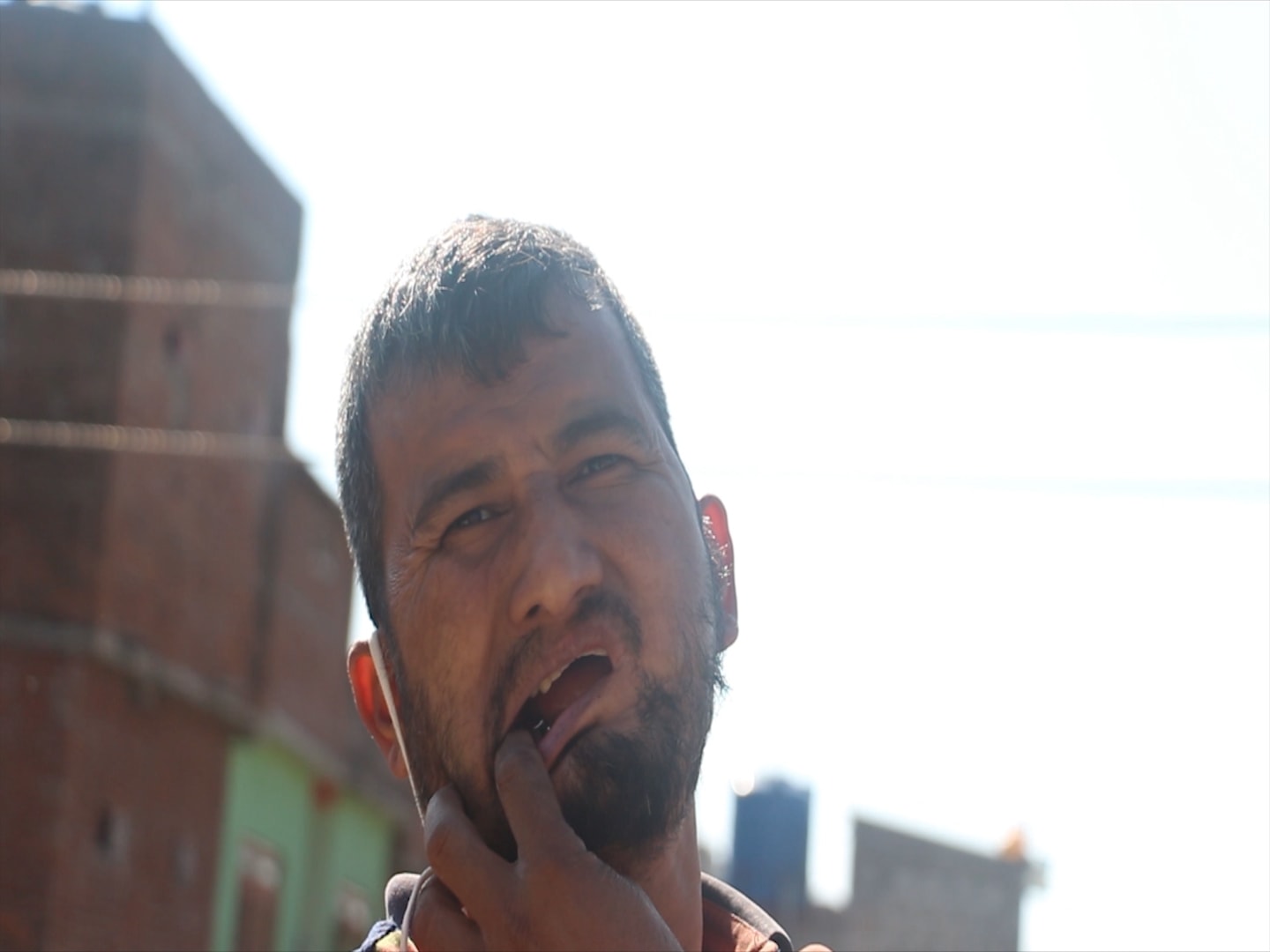
Lok Bahadur BC
Swarnim can walk only with the help of prosthetic legs. He wants to replace the existing artificial leg with a new one which costs Rs 500,000. He’s worried about how to arrange funds to buy new ones.
According to a documentary prepared by the Peace and Reconstruction Ministry 17,828 people were killed and the number of former Maoist combatants critically injured like Swarnim and Chetana stands at 5,912.The couple’s story represents hardship of many other former combatants.
Lok Bahadur BC, a local of Triveni Rural Municipality-2 Danda, Rukum (West), is another war victim. The bullet pierced through his body while fighting against the government formed Unified Command in Jhulkhet of Rukum on 14 July 2002. Considering that he’s already dead, his fellow comrades had left him unattended around the battleground. But he managed to come out from there, reached India, went through seven surgeries and later survived. Two iron pieces and 23 clips are still attached on his face.
He had been receiving Rs 6,200 as monthly allowance. The government has suspended the same allowance these days. And Lok Bahadur, who had then thought Rs 600,000 money provided by the government before leaving the cantonment and monthly allowance, would help his survival now feels helpless.
Humiliated to return home village in Rukum, Lok Bahadur started a business in Dang. But it didn’t work well. He and his friends have now jointly purchased a truck and he works as a loader.
“Fellow comrades became ministers but they never remember us,” he said who has been working as a loader for the same truck while cleaning the truck after unloading the stuff.
A dark world
Lal Bahadur Oli of Kumakh Rural Municipality-2, Kharkhola, can’t see outer world since he sustained serious eye injury while attacking a Bhalubang-based APF base camp on October 12, 2003 and later at a cross fire with security forces in Siddhadhara of Arghakhachi on November 2003. He was arrested in Balrampur of India while sneaking there for treatment, and was handed over to Kapilvastu police. Because of excessive torture at police station, he later lost his eyesight.

Lal Bahadur Oli
His life is dark. Frustration is high. “We destroyed our families, we damaged our life in the name of revolution,” said Lal Bahadur, “These days, those leaders holding positions don’t remember us, even don’t receive phone calls when needed.”
In an extensive interview Lal Bahadur recalled his pre-Maoists army days. “Rolling down tears in their eyes, my parents had urged me not to join the Maoists. I had replied to them “we will win the world and will return soon,’ he added, “These days, I can’t even appear before them.”
Lal Bahadur married Sita KC, an injured Maoist ex-fighter in September 2005. She was later diagnosed with cancer and it incurred Rs 400,000 to cure the disease in Chitwan. Failed to settle loans he’s now debt-ridden. By seeing the condition of blind husband, her own injuries and the disease, she is mentally depressed. She needs to take medicine to heal mental illness.
“We were physically strong in the past, that’s why the leaders liked us. Currently, no one cares us,” said Sita, “I wish I could forget those old days but it’s hard to forget as I had spent half of my precious life in war. That’s why memories come to my mind even though no one remembers us these days.”
Because of their fragile physical health conditions, the couple didn’t return to their home village in Salyan. They have started poultry goat farming in Paheplar of Tulsipur for survival.
Joined the Maoists armies in 2000, the couple now regrets fighting the war. “Monthly expenses stand more than 20,000. Mere republic doesn’t work in life. The country has been declared a federal republic but our life is really in pain.”
Keshav Chaudhary, 37, of Ghorahi Sub-metropolitan City, lost his eye to war. The former brigade commander was leading his armies while attacking Khara army barracks on May 27. Since his body is covered with shrapnel, he needs to take medicine to heal pricking pain.
“We dared to sacrifice our life in the past but we are now worrying how to survive, how to manage medicines and feed the family members,” said Keshav.
His wife, Laxmi, is also in despair as neither he can fully focus on work nor the husband capable enough to work. “Raising children has become a major challenge,” she said.
The story of Kumari Nepali, 31, of Bagalchuli, Dang is not different from others. Nepali, who had joined the Maoists war, with commitment of big political change, is now struggling to shape her own life. She lost an eye in a crossfire with the army in Kapilvastu. Her body is also covered with shrapnel.
Having no job opportunities, her husband, Nim, also a former Maoist combatant, has reached Saudi Arab. Raising two sons and a daughter has become a herculean challenge. And she often cries in pain, “Leaders and commanders landed their carrier to top positions, our life is doomed.”
Overburden life
The Maoists had raised issue of deeply rooted caste-based discrimination to attract more youths towards war. Lured by promises of ending casteism, Bhul Bahadur BK of Rukum (East) joined them. Although he fought several wars his final Jumla battle proved costly for him. Bullet pierced through his right leg while trying to capture Jumla’s district headquarter, on 24 November 2002. Due to lack of timely treatment his leg was amputated.
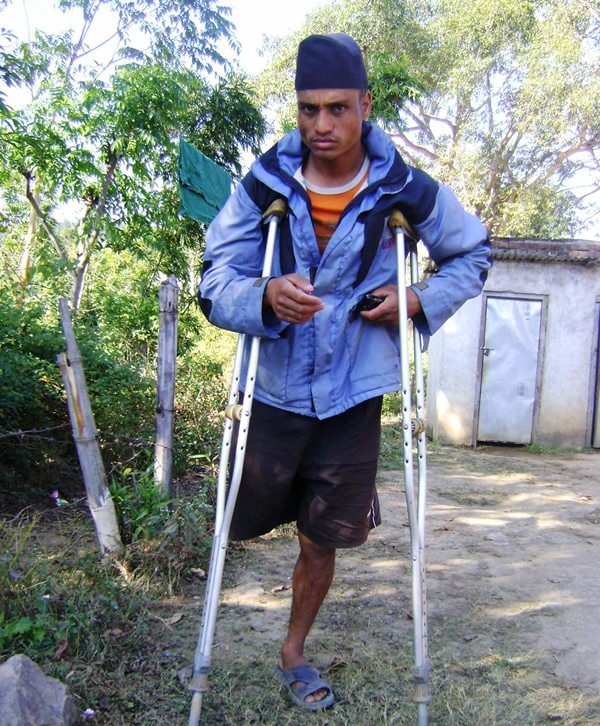
Bhul Bahadur BK
“I’m facing punishment for joining people’s revolution,” he said.
Like many other former Maoist combatants Bhul Bahadur also didn’t return home. He’s staying in Dhankhanne of Tulsipur together with his wife, three sons and a daughter. “I didn’t like to return Rukum with a single leg. I have built a small house here after choosing voluntary retirement,” said Bhul, “The real war against poverty has just begun in my life. Nothing is left with me as I spent my precious days fighting war.”
The Maoist ‘revolution’ has shattered the dream of Chakrapani Sharma, a local of Kotmaula, Salyan, too. On April 7, 2005, he was badly injured while attempting to capture Khara’s army barracks. His body parts below waist are motionless so he can barely stand with the help of crutch and a helper.
Categorized as a seriously injured disabled person Chakrapani had been receiving Rs 12,400 monthly livelihood allowance from the government. The government stopped allowance, the sole source of survival, since mid-June last year. And he’s now in despair.
During the insurgency Maoists campaigned for rights of injured, disable and disappeared people. But they have put these issues backburner after ascending to power. “Had we fought war to live such a life?” Chakrapani questioned.
Injured ex-armies like Chakrapani have been demanding to ensure their treatment expenses, help in livelihood and ensure education for children. “The government can give us a doable job if they think it’s impossible to make money,” he demanded.
Chakrapani’s wife, Sachitra, who has been taking care of injured husband and five of her daughters, says she doesn’t respect politicians at all. “Perhaps, even martyrs didn’t suffer like us. We are alive but feel as if we are dying multiple times,” Suchitra complained, “Death would be a respite. The government can kill all of us injured and disable ex-fights if we are burden.”
Chandra Bahadur Pun had joined the Maoists army in 1999, the year when he was a tenth grader. As war ended signing a peace agreement some of his comrades were adjusted in the national army, some returned home as part of voluntary retirement. Chandra Bahadur also preferred voluntary retirement but didn’t want to return home because he had lost a leg to a landmine while trying to take Arghakhachi’s headquarter under control, on September 8, 2002.
He has built a small house in Bijauri of Dang. Chandra Bahadur had just touched 15 years when he joined the Maoists army. Then, he was genuinely excited. But he can barely walk with the help of a crutch these days. “The Constitution is promulgated; a new system is in place. And our blood is mixed into these changes,” said Chandra Bahadur, “But none remembers fighters fighting for the same. Our condition is worsening day by day.”
Chandra Bahadur’s wife, Hiramoti, also an ex-combatant is handling household activities whereas Chandra Bahadur is running a hardware shop in Solabang of Rukum (West) in partnership.
‘Haunting Dreams’
Bhumi Lal Chaudhary, 36, of Tulsipur Sub-metropolitan City, had sustained injuries from bullets in Bandipur and Myagdi. Left hand isn’t working. “I often wonder about a job but none gives me a job as a single handed person,” said Bhumi Lal adding, “I’m unable to arrange household expenses and ensure treatment. We devastated our precious life in war.”
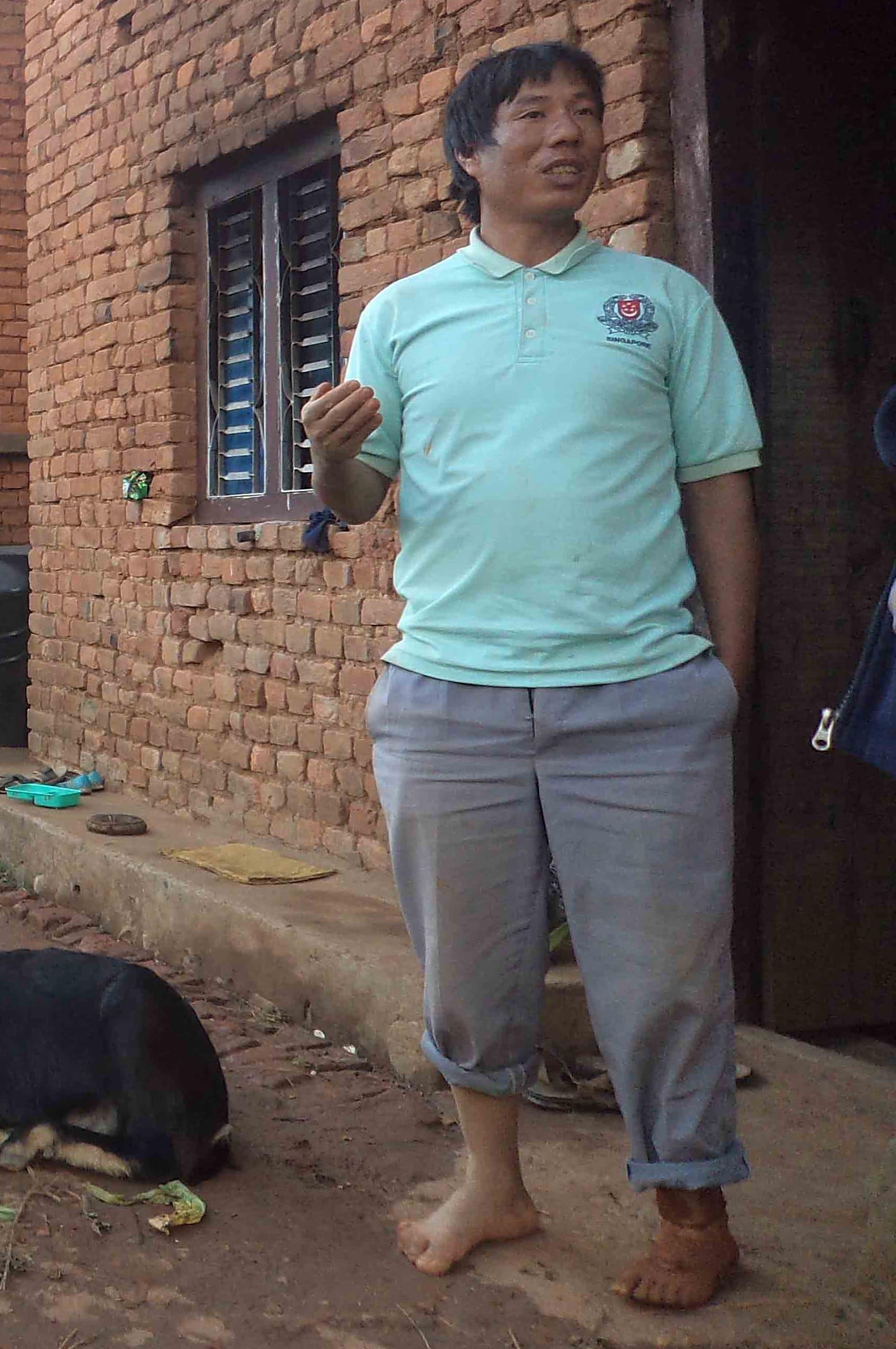
Chandra Bahadur Pun
Udaya Sherpaili, 43, of Purtimkanda, Rukum shares similar views. “All the sacrifice made for war went futile,’ said Sherpaili. A bullet had pierced through his chest. Like many injured ex-combatants, he didn’t go to home village after retirement. Instead, he built a house in Hemantapur of Tulsipur.
“I thought I wouldn’t be able to face society so couldn’t dare to return home,” said Udaya adding, “I avoided my society but couldn’t avoid livelihood. These days, I often think sacrifice was for humiliation.
Khusi Ram Chaudhari, 46, of Ghorahi, worked as a Maoist army. He cannot move his body as he wishes after the bullet sustained injuries on head, chest and neck. “Both hands and legs have stopped working. I can’t do anything, said Khusi Ram, adding, “I have to take medicine throughout my life. I have no money to buy medicine.”
Khusi Ram feels his dreams have already been shattered. “Leaders showed us dreams. We fought to fulfill a dream risking our lives but those dreams still haunt us.”
Sundar Chaudhary, 36, is another victim. A bullet entering from the neck pierced through the head. “I luckily survived but life became more painful after surviving. I feel I’m alive to face humiliation and negligence. See lifestyle of leaders and compare it with our”
Dil Kumari Malla of Banfikot-1, Lagim, who was a six grader when she joined the Maoists army in 2001, fought more than 29 battlegrounds. A year after becoming Maoist combatants she reached Khalanga, Jumla district headquarters, crossing snow-capped mountains of Rukum and Jajarkot. During her way to Khalanga Dilkumari and Dhan Bahadur Pun from Banfikot fell in love. Later, she married Dhan Bahadur.
The couple had fought together aimed at capturing Khara-based Army base. Failed to defeat the armies, they had returned to Dalsing, a border point of Rukum and Salyan. Army opened fire at the Maoist armies and Dilmaya lost her husband. “I consoled myself considering sacrifice of life was inevitable,” said adding, “And I started to continue my war.”
After Maoists signed the peace deal Surjit Budha, another injured ex-Maoists combatant from Kavra, Salyan, was kept at a Dang-based cantonment wherein he married second wife. Legs have become numb so he can’t work. As her body is covered with shrapnel Dil Kumari is facing pricking pain. After retiring from cantonment, they built a small house and started vegetable farming in Syani Damar village. For them survival is difficult.
“Then, we had dreamt of winning the world. But we are doing household chores, vegetable and goat farming. What did we get for fighting?” she questioned.
Faulty Classification
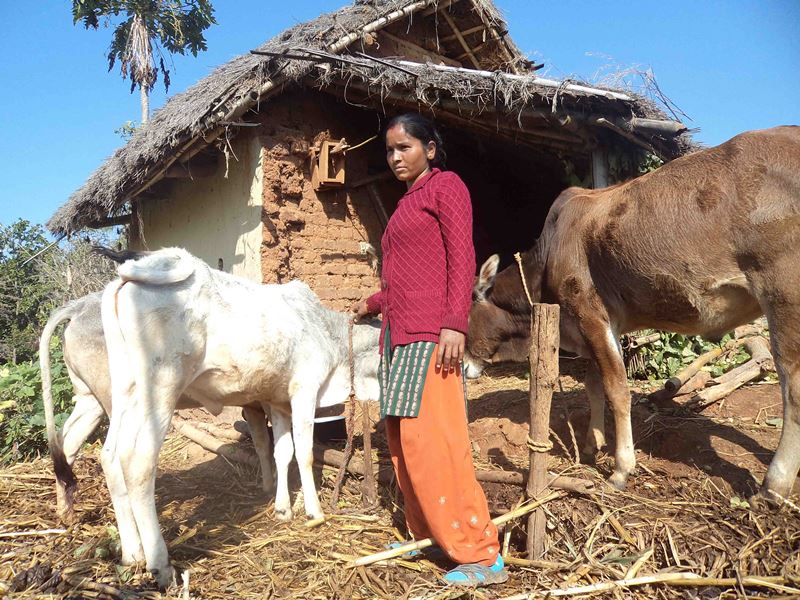
Dil Kumari Malla
A guideline introduced in 2017 has a provision to provide 12,400 monthly allowances for Maoist ex-combatants who are categorized as highly critical disable persons. Any injured person with proved more than 75 percent disability and required a helper fall under this category. Likewise, persons categorized as first class disable (those injured with 50 to 74 percent disability) get 6,200 as per the guideline. Injured ex-Maoist combatants with 25-49 percent disability and 24 percent disability are categorized as second and third category. Those ranked in second and third categories don’t get allowances.
Under the guideline a committee headed by chief district officer recommends disability percent before quality control and regulation department chief of the Health Ministry finalizes it. Injured persons get allowances only when the disability approve committee headed by home secretary approves categorization proposal.
Khageshwor Gharti, coordinator of injured ex-Maoist combatants, complains many injured combatants were missing in categorization. Of the total injured combatants in Dang only 22 receive allowance. “Many haven’t received allowances and allowance receiving combatants are also getting less these days,” said adding, “Because of this many are deprived of taking medicine.”
Even as Gharti submitted a memorandum at the home ministry demanding that allowance be provided to all combatants his demands remain unaddressed.
According to injured combatants’ leaders out of total 160,00 injured combatants more than 800 persons have been struggling with permanent disability. They say about 4000 are combatants who are yet to be included in the injured list. “Many missed the opportunity to fill forms. Should they be left in a life-death situation?” said Jiban Budha, head of the injured Maoist ex-combatant’s group.
Home Ministry’s spokesperson Chakra Bahadur Budha, however, argued the government can’t provide allowances to disabled persons forever as disability gradually improves. “Annual evaluation shows disability percent increases every year. And the government can’t provide allowance when disability percent stands below 50 percent,” Budha argued.
The spokesperson said disability percent was determined based on the medical report. He ruled out the possibility of any bias in categorizing disability. “If anyone is missing or isn’t satisfied with the categorization process, they can register another application. Based on the evaluation result some of the applicants may get allowance,” he said.



